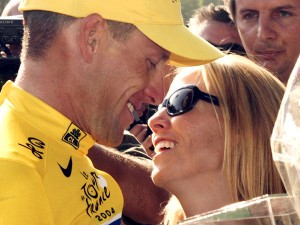Armstrong facing big financial hit over doping ban

This July 25, 2004, file photo shows Lance Armstrong kissing Sheryl Crow as he celebrates his sixth straight Tour de France cycling race victory in Paris. World cycling’s decision to strip Armstrong of his record seven Tour de France wins could cost the shamed US rider millions. AP
PARIS—World cycling’s decision to strip Lance Armstrong of his record seven Tour de France wins could cost the shamed US rider millions, amid calls for tougher action to restore the sport’s shattered image.
The International Cycling Union (UCI) on Monday gave its backing to a damning US Anti-Doping Agency (USADA) dossier that placed the Texan at the heart of the biggest doping program in sport, erasing his record back to August 1, 1998.
But as the 41-year-old’s major triumphs were scrubbed from the history books and officials vowed to up the fight against banned substances, moves began to recoup his prize money, bonuses and other pay-outs.
Tour de France director Christian Prudhomme on Monday said they would seek the repayment of nearly 2.95 million euros ($3.8 million) from Armstrong’s successes in cycling’s most gruelling and celebrated race between 1999 and 2005.
During Armstrong’s dominant period, Tailwind Sports, the parent company of his US Postal Service team, took out a policy with sports insurance firm SCA Promotions, paying a premium to cover bonuses paid for his Tour victories.
SCA withheld a $5 million bonus due after Armstrong’s sixth Tour win in 2004 because of doping allegations in Europe. The rider took the Dallas, Texas, firm to court and was awarded the cash, plus $2.5 million in legal fees and interest.
The firm’s lawyer, Jeffrey Dorough, told AFP: “Mr. Armstrong is no longer the official winner of any Tour de France races and as a result it is inappropriate and improper for him to retain any bonus payments made by SCA.”
The Velonation cycling news website reported that SCA paid out a total of $12 million in bonuses to Armstrong over the years. Dorough said he could only confirm the lower figure but added: “Any sum that was paid by SCA would be in play.”
Elsewhere, Britain’s Sunday Times newspaper has said it is considering legal action against Armstrong to recover money spent defending a defamation case over doping allegations, which was settled in 2004.
The settlement was not disclosed but reports have suggested the case cost the weekly newspaper one million pounds ($1.6 million, 1.2 million euros).
Armstrong, who reportedly has an estimated net worth of $125 million, has already taken a financial hit, as high-profile sponsors including sportswear firm Nike have dropped him from marketing campaigns.
Business magazine Forbes said on its website on Monday that Armstrong could lose $15 million a year in endorsements and speaking fees.
On the legal front, he could yet face court action for perjury after swearing on oath that he never doped. If any charge is pursued, the maximum penalty is up to 30 years in prison and a fine of up to $1.5 million.
The Armstrong case has cast a dark cloud over world cycling, with its most recognizable star fallen from grace and the USADA dossier outlining the extent and scope of the use of banned substances in the sport in the late 1990s and early 2000s.
Current and former cyclists have spoken of how they have felt deceived by Armstrong, who battled back from life-threatening cancer to stage what was billed at the time as the greatest comeback in sport.
That Armstrong deceived everyone for so long has also hit the credibility of the UCI, which has been accused of, but strongly denies, turning a blind eye to his activities and even accepting donations to cover up positive tests.
The head of the World Anti-Doping Agency, John Fahey, said on Tuesday that the sport’s administrators had to take responsibility for that time when “everybody doped,” despite UCI chief Pat McQuaid’s insistence that only riders were to blame.
“Is that period gone? That’s something which I think the jury is out on and I think UCI are meeting this Friday to consider a number of aspects, including what their response must be, going forward,” the Australian told ABC Radio.
In a separate interview with Australia’s Fox Sports, Fahey added that cycling would only regain credibility when the senior officials on watch during the “debacle” were removed.
“I don’t think there’s any credibility if they don’t do that and I think they need to get confidence back into the sport, so that its millions of supporters around the world will watch and support the sport going forward,” he added.